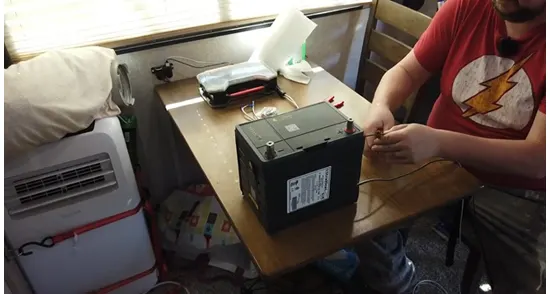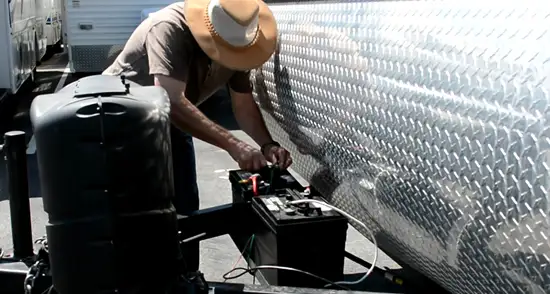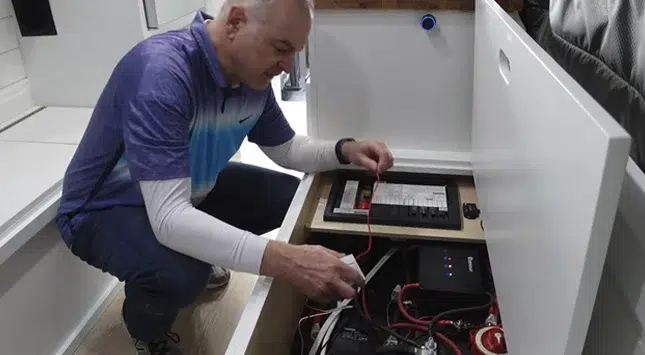Last Updated on December 20, 2022
Anyone who has ever used a lithium battery knows that they are incredibly sensitive to cold temperatures. In fact, these batteries can lose up to 60% of their capacity when exposed to freezing temperatures. As a result, the chemical reaction of the batteries slows down, resulting in a decrease in power output.
Thus, it should come as no surprise that RV batteries should be kept warm to get optimum power output. While this may require some extra effort, it will ultimately help to prolong the life of your batteries and save you money in the long run.
So, how to keep RV lithium batteries warm? In this article, we will share some tips on how to keep these batteries warm and get the most out of them.
How to Keep RV Lithium Batteries Warm in Freezing Temperatures: Guidelines

1. Bring Them Inside: The temperature outside can affect the performance of the battery. Hot temperatures can lead to the battery overheating, while cold temperatures can make it difficult for the battery to hold a charge. You can keep the lithium ion battery at a constant temperature by bringing it inside.
2. Use a Battery Heating Pad: One of the best ways to keep your RV battery warm is to invest in a quality battery heating pad. These pads are designed to fit over your lithium RV battery and gently heat the surrounding area.
This helps to prevent the battery from freezing and maintain optimal power levels. Additionally, battery heating pads are relatively inexpensive and easy to use.
3. Use a Space Heater: A space heater can be placed near the batteries, and it will help to stabilize the temperature. It is important to remember a few things when using a space heater.
First, make sure that the area around the space heater is well-ventilated. Second, don’t let the space heater run for more than an hour at a time. And finally, don’t leave the space heater unattended.
4. Use a Battery Blanket: RV battery blankets are an easy and effective way to keep your lithium RV batteries warm during cold weather camping trips. By keeping the batteries warm, you’ll extend their lifespan and prevent them from freezing and cracking.
When choosing a battery blanket, be sure to select one that is specifically designed for lithium RV batteries. These blankets are made of a lightweight, insulating material that will not overheat the batteries. Most battery blankets come with a storage bag for easy packing and storage.
To use the battery blanket, simply remove it from the storage bag and wrap it around the entire battery pack. The blanket should be snug but not so tight that it constricts the battery’s airflow. Once the blanket is in place, plug it into a standard 110-volt outlet and turn on the switch.
It will automatically begin to heat up, providing gentle and even warmth to the batteries. Depending on the size of your RV battery pack, you may need to leave the blanket on for several hours to ensure that the batteries are fully warmed.
Be sure to monitor the temperature of the batteries during this time to avoid overheating. After the desired temperature is reached, turn off the switch and unplug the blanket from the outlet.
5. Using Radiant Heat Film:
In order to ensure optimal performance, it is important to keep RV lithium batteries warm. This can be done by using a radiant heat film. The film works by absorbing and storing heat energy, which is then released as infrared radiation.
This helps to maintain a consistent battery temperature, even in cold environments. Additionally, the film can also help to protect against thermal runaway, a condition that can occur when the battery overheats and causes damage.
6. Super Bright Led Light: One option is to use a super bright LED light. These lights produce a lot of heat, which can help to raise the temperature inside your RV. You can purchase these lights at most online stores.
Why Do We Need to Keep RV Lithium Batteries Warm?

Lithium batteries are increasingly becoming the battery of choice for RVs. They are lighter and more powerful than lead-acid batteries, and they don’t require as much maintenance.
Lithium batteries do have one downside: they don’t like cold weather. When temperatures drop, the chemical reaction inside the battery slows down, which reduces its ability to produce electricity.
Freezing temperatures can also cause the battery to discharge faster than normal, which can lead to problems starting the RV. So, if you’re planning to use your RV in cold weather, it’s crucial to keep your lithium batteries warm.
What Happens When the Temperature of RV Lithium Battery Drops Below Freezing?
A lithium battery in an RV can suffer cell damage if its temperature falls below freezing. The chemical reaction that typically takes place inside the battery cells is slowed down, and this can prevent the battery from holding a charge.
In some cases, the cells may even crack, which can cause a loss of electrolyte solution and lead to a dangerous short circuit. You should take precautions to protect your RV lithium battery if you live in a region where temperatures regularly dip below freezing since this will help you avoid having to spend money on repairs in the future.
So, How Do We Avoid These Situations?
- Make sure the batteries are fully charged before heading into cold weather. To keep them from freezing, this will give them a boost when they are needed most.
- Keep the batteries warm by wrapping them in blankets or towels. This will help to prevent damage and also keep them operating at peak efficiency.
- Maintain the battery levels by adding water as needed.
By taking these simple steps, you can help to ensure that your RV batteries stay healthy and operational all winter long.
Can Lithium Batteries be Stored Outside?

When it comes to storing lithium batteries, there are a few things to keep in mind. First of all, it’s important to keep them away from extreme temperatures. Lithium batteries can be damaged by both extreme cold and extreme heat, so it’s best to store them in a cool, dry place.
Additionally, it’s important to make sure that the batteries are not exposed to direct sunlight. Sunlight can also damage lithium batteries, so it’s best to keep them in a shady spot. Finally, it’s important to keep lithium batteries away from water.
You should keep your battery in a dry environment since even a small amount of moisture can damage the delicate cells. With these guidelines in mind, you can safely store your lithium batteries outside without worry.
FAQs:
What Temperature is Too Cold for Lithium Batteries?
Under extremely cold temperatures below 32 degrees Fahrenheit, a lithium battery’s capacity is reduced. This is due to the fact that the internal chemical reactions of the battery slow down at low temperatures.
The battery’s electrolyte becomes less conductive, making it harder for electrons to flow. As a result, a lithium battery will not be able to produce as much power in cold temperatures.
What Temperature Should Lithium Batteries be Stored At?
The ideal storage temperature for lithium batteries is actually around 15°C (59°F), but they can remain operational within the stated range. Temperatures outside of this range can cause the battery to degrade more quickly.
Will a Fully Charged Battery Freeze?
If a battery is already fully charged, there is less of a risk of damage from freezing. This is because the electrolyte inside the battery is more concentrated when the battery is fully charged, and therefore it is less likely to expand and cause damage.
As long as the battery is not damaged by freezing, it can be recharged and used normally once it thaws out.
Does Charging a Lithium Battery Warm it Up?
The short answer to this question is yes, charging a battery will cause it to heat up. This is because the charging process involves chemical reactions that generate heat. The amount of heat produced will vary depending on the type of battery and the charger being used.
A fast charger also tends to generate more heat than a slow charger. While this heat is not typically enough to damage the battery, it can be uncomfortable to the touch.
As a result, it is important to exercise caution when handling a hot battery. If the battery feels too hot to touch, it is advisable to wait for it to cool down before handling it further.
Conclusion:
Ideally, you should keep your RV lithium batteries warm year-round. During the winter months, when temperatures can dip below freezing, it’s especially important to take steps to prevent your batteries from freezing.
One way to do this is to install a battery heater. Another option is to store your batteries in a heated space, such as a garage or shed. If neither of these options is available to you, you can try wrapping your batteries in insulating material, such as blankets or towels.
By taking these precautions, you can help ensure that your RV lithium batteries stay warm and continue to work properly. So don’t let the winter blues get you down! Keep your RV lithium batteries warm and enjoy them all!



